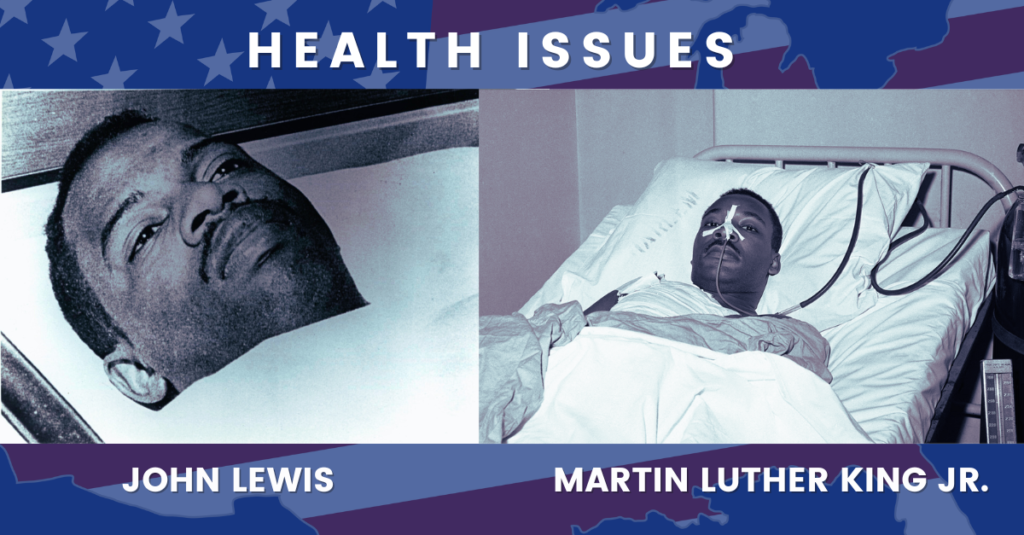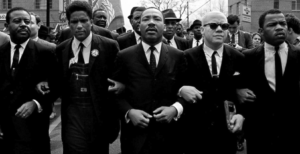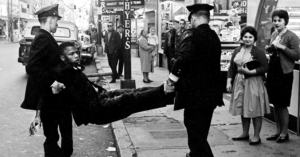
In the annals of African-American history, the names Martin Luther King Jr. and John Lewis resonate as powerful symbols of the Civil Rights Movement. While their tireless efforts and indomitable spirits have been well-documented, the toll on their health often remains in the shadows. Beyond the iconic images and powerful speeches lie stories of silent struggles, lesser-known health-related issues that plagued these leaders.

The Silent Struggles of Martin Luther King Jr.
- Physical Stress Amidst Protests: Martin Luther King Jr.’s commitment to nonviolent protest was unwavering, but the toll on his body was immense. Constant marches and protests subjected him to physical stress, resulting in fatigue and, at times, compromising his immune system.
- Mental Health Battleground: Behind the charismatic leader was a man grappling with the weight of societal expectations. King’s mental health bore the burden of the movement, contributing to stress-related ailments that impacted his overall well-being.
- Targeted Surveillance and Stress: The FBI’s intense scrutiny of King placed him under constant surveillance, causing heightened stress levels. This stress wasn’t just psychological; it manifested physically, impacting King’s health in ways that history often overlooks.

John Lewis: A Health Journey in Activism
- Brutality and Physical Trauma: John Lewis, an advocate for nonviolent protest, endured brutal physical attacks during marches and demonstrations. The toll of these beatings had lasting effects on his health, contributing to chronic pain and injuries.
- Emotional Trauma of Arrests: Lewis faced numerous arrests in his pursuit of justice. Each arrest brought with it emotional trauma, impacting his mental well-being and contributing to the overall health challenges he silently faced.
- Long-Term Effects of Tear Gas Exposure: Lewis, along with fellow activists, experienced the harsh reality of tear gas during protests. The long-term health effects of tear gas exposure, often underestimated, added to the health challenges faced by these activists.
The Overlooked Legacy: A Call for Awareness
- Neglecting Self-Care for the Greater Cause: Both King and Lewis, driven by their commitment to justice, often neglected their health in service to a greater cause. The narrative of their sacrifices should encompass not only their societal contributions but also the health struggles borne in silence.
This exploration into the lesser-known health challenges faced by Martin Luther King Jr. and John Lewis aims to shed light on the human side of activism. As we commemorate their legacies, it is imperative to acknowledge the physical and mental toll their commitment took. The overlooked health dimensions of these iconic figures serve as a reminder that activism while inspiring, comes with personal sacrifices.
A Legacy Beyond Marches: Continuing the Fight for Health Equality
By acknowledging the health struggles of these Civil Rights icons, we don’t diminish their achievements; we deepen our understanding of their sacrifices. Their stories serve as a powerful reminder that the fight for justice isn’t just about public marches and fiery speeches; it’s also about ensuring equal access to healthcare, mental health resources, and the right to live free from discrimination.
The fight for health equity continues today. While significant progress has been made, disparities in healthcare access and outcomes persist. We must honor the legacy of King and Lewis not just by celebrating their public victories but also by working towards a society where everyone, regardless of race or background, has the opportunity to live a healthy and fulfilling life.
Resources:
- The King Center: [https://thekingcenter.org/]
Read More in the Books listed below:
- John Lewis: Walking with the Wind
- The Hidden History of American Healthcare
- Health Disparities in the United States: Social Class, Race, Ethnicity, and the Social Determinants of Health





